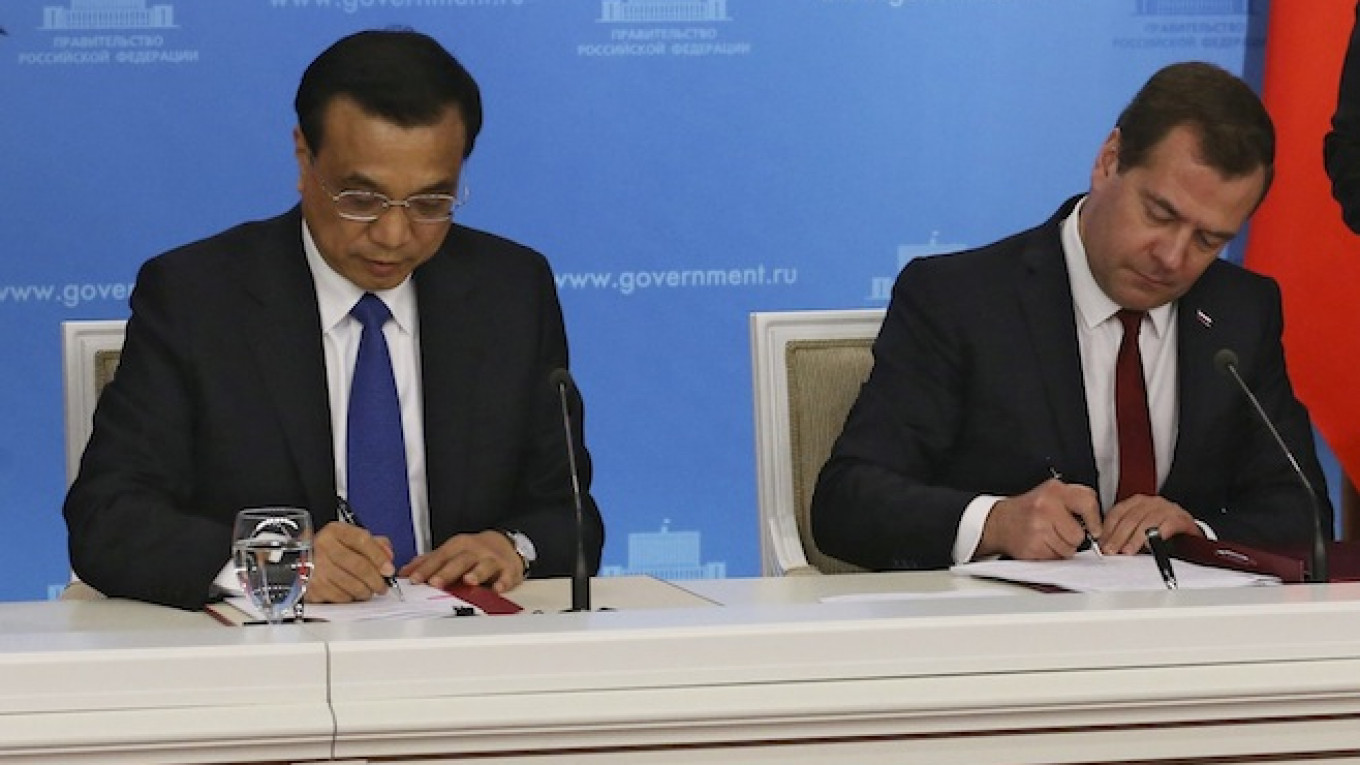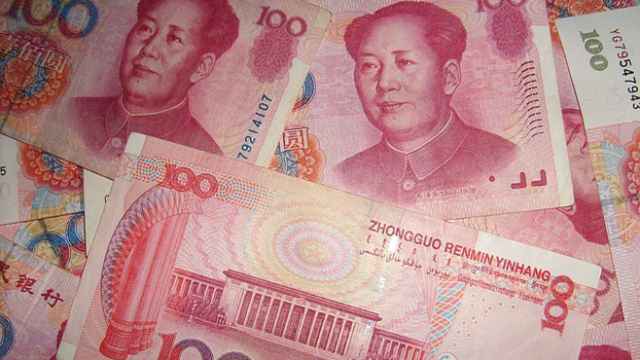Russia and China signed energy, trade and finance agreements on Monday proclaimed by Moscow as proof that a policy turn to Asia is bearing fruit and will help it to weather Western sanctions over the Ukraine crisis.
The 38 deals, signed on a visit to Moscow by Premier Li Keqiang, allow for deeper cooperation on energy and a currency swap worth 150 billion yuan ($25 billion) intended partly to reduce the sway of the U.S. dollar.
They are among the first clear successes of the eastward shift, ordered by President Vladimir Putin to avoid isolation over the sanctions, since the vast nations reached a $400 billion, 30-year natural gas supply agreement in May.
"I consider it important that, in spite of the difficult situation, we are opening up new possibilities," Russian Prime Minister Dmitry Medvedev said after the signing ceremony.
In a sign that mistrust has still not been completely buried, Li was less effusive, even when holding out the prospect of a deal in 2015 to build a second pipeline along what is called the Western route to ferry Russian gas to China.
"Cooperation over natural gas between Russia and China goes back quite a long way," Li said. But he added: "Further discussion is needed between companies."
For Russia, the agreements offer some relief, with the European Union and the United States showing no signs of lifting sanctions imposed over Russia's annexation of the Crimean Peninsula and its backing of separatists in east Ukraine.
The sanctions target the finance, energy and defense sectors, restricting some state firms' and banks' ability to raise financing in Western markets.
The currency swap strengthens China's plans to promote international usage of the yuan following pledges by Moscow and Beijing to settle more bilateral trade in rubles and yuan. Spurred by their often fraught relations with the United States, Russia and China have long advocated reducing the role of the dollar in international commerce.
China, which has 32 percent of its $4 trillion foreign exchange reserves invested in U.S. government debt, would like to cap its vulnerabilities to any fluctuations in the dollar in the near term. Over the longer term, it wants to increase the yuan's clout and turn it into a global reserve currency.
Eastward Shift in Oil Supplies
Medvedev said trade turnover between Russia and China had grown by more than 100 percent over the past six years from $40 billion to $90 billion.
"We are very close partners," he said, although trade with the combined 28 nations of the EU is greater than with China.
Under the new agreements, cooperation will deepen between state oil producer Rosneft and China National Petroleum Corporation, including in liquefied natural gas (LNG) projects and possibly LNG supplies to China.
Banks VTB, VEB and Russian Agriculture Bank — like Rosneft hit by sanctions — signed framework agreements with China Exim bank to open credit lines.
Mobile phone operator MegaFon and China Development Bank agreed to arrange financing of $500 million.
Li, who arrived from Germany and will go on to Italy for a summit of European and Asian leaders later this week, is expected to hold talks with Putin on Tuesday.
Another sign that Russian ties with Beijing are improving was the release of energy ministry data showing crude oil supplies to China rose in January-September by almost 45 percent year-on-year. Shipments from the Baltic Sea port of Primorsk toward Europe fell almost 20 percent.
"Much greater changes can be seen in the geographical distribution of these shrinking exports, with flows to the West clearly losing out against prioritized links to the Far East, a trend that could easily be accelerated further in the current political climate," JBC Energy consultancy said in a note.
Beijing has made clear it wants to increase business with Russia and cash in on the crisis in relations between Moscow and the West, now at their worst level since the Cold War.
But time will be needed to end mistrust in relations between countries that almost went to war in a border dispute in the 1960s, when Russia was part of the communist Soviet Union.
Beijing is interested in investing in infrastructure, energy and commodities in Russia, but Moscow long had reservations about allowing Chinese investment in strategic industries.
China may also have worries about investing in an economy that is stuttering, with the ruble hit by sanctions and a drop in the price of oil, Russia's most important export commodity.
A Message from The Moscow Times:
Dear readers,
We are facing unprecedented challenges. Russia's Prosecutor General's Office has designated The Moscow Times as an "undesirable" organization, criminalizing our work and putting our staff at risk of prosecution. This follows our earlier unjust labeling as a "foreign agent."
These actions are direct attempts to silence independent journalism in Russia. The authorities claim our work "discredits the decisions of the Russian leadership." We see things differently: we strive to provide accurate, unbiased reporting on Russia.
We, the journalists of The Moscow Times, refuse to be silenced. But to continue our work, we need your help.
Your support, no matter how small, makes a world of difference. If you can, please support us monthly starting from just $2. It's quick to set up, and every contribution makes a significant impact.
By supporting The Moscow Times, you're defending open, independent journalism in the face of repression. Thank you for standing with us.
Remind me later.






